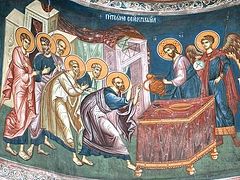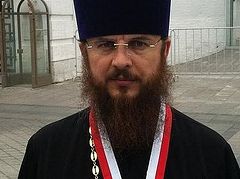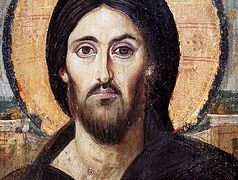Archimandrite Markell (Pavuk), a professor and the confessor of the Kiev theological schools and author of the book, Is it Easy to be a Saint?, on the fruits of Philaret’s schism and the loss of the meaning of the Christian feasts.
—Dear Fr. Markell, happy forthcoming Nativity of Christ! What gave me the idea of talking to you was the ads and congratulatory texts on social networks, secular media and billboards: “Happy New Year and Nativity!”, “Merry Nativity!”, “Have interesting adventures in the Nativity season!”, and so on. The name of Christ is not mentioned at all. What should we think about this? It seems we are adopting the values of the Catholic and Protestant world ever more deeply?
—It was only thirty years ago that our Church recovered a relative outward freedom. Before then, Soviet propaganda presented everything associated with religion as a dangerous vestige of the past that impeded “scientific progress and the building of Communism.” But in the late 1980s, when our clergy were given the freedom to preach in churches and through media, a great problem emerged in Western Ukraine with the aggressive restoration of the Unia. After that, under political slogans Philaret’s autocephalous schism started developing. All these factors delivered a severe blow to people’s religiosity—the effect was as strong as under State atheism. As a result we have lack of faith, ritualism, sectarianism and such vapid billboards.
—But how can we explain this to our brothers—journalists, advertisers and educators of the youth?
—If our advertisers, media workers, and the whole educational system cared more about the preservation of our spiritual historical traditions and culture, we would see less of this low-grade copying and blind imitation of these Western symbols with Santa Claus and the Christmas goose. The reality is that our public holidays, timed to such religious events as the Nativity of Christ, Pascha or St. Nicholas day, mostly come down to our culinary needs and entertainment shows. There is no argument that the responsibility rests largely with our Ukrainian Orthodox Church; however, you see what circumstances our politicians are driving us to. Take the post-Maidan period alone!... I wouldn’t like to speak about this during the holy days. We shouldn’t forget that, according to the Gospel, the whole world lieth in wickedness (1 Jn. 5:19). And year after year this evil is wrapped in ever more cunning “packages”, though they look glamorous and attractive. But they only look that way… We Christians should not be confused or give way to despair, keeping Christ’s words in our mind: Be of good cheer; I have overcome the world (Jn. 16:33).
—In your opinion, where is the source of modern secularism? Why did Fyodor Dostoevsky write in the late nineteenth century that in Europe we can only bow down before the graves of disappeared Christian culture?
—In Russia, under the influence of Western Protestant ideas, the policy of secularism was actively pursued as long ago as the early eighteenth century by Emperor Peter I, and later—by Empress Catherine II. They greatly contributed to the outward prosperity of the Russian Empire, which then comprised most of what is now Ukraine. But, as time went by, they (perhaps without fully realizing it) used the state to oppose the Church. As the historian Vasily Klyuchevsky (1841—1911) said, “Peter put Russia on the rack.” From the eighteenth century on, Church pastors gradually lost the freedom to preach. Priests were only allowed to read their instructions in churches from notes with a consistorial official’s permission. Take the short story “Cathedral Clergy” by Nikolai Leskov (1831—1895), which recounts what happened to a priest who dared preach on his own without special permission.
As a result of this control, many began to treat the Church with increasing distrust—the well-educated part of society in particular. So, though Dostoevsky idealized the level of Russian society’s religiosity compared to Europe, the split between Church and State was probably more dangerous for people’s religiosity than the Western veneration of the disappeared Christian culture’s graves. The tragedy of the Revolution of 1917 and anti-Church State terror that followed were just the bitter aftermath of the preceding stages of secularization. We are still tasting its bitter fruits.
—In one of his interviews His Beatitude Metropolitan Onuphry said, “The Nativity of Christ has become a state holiday, but no one explained what people should do on these holy days and how they should behave, how to take the right way of Christian self-improvement. In fact, those who have the authority to proclaim it do not know it themselves. It reminds me of the blind leading the blind...”1 Now even the Catholic Nativity is one of our public holidays. Why? Is it a political move or the struggle with Orthodox traditions?
—I believe everything has been mixed up here: politics, religion, and above all—our human weaknesses, namely the passions of anger and love of money, which are being actively fomented by the media. Our primary responsibility as Church pastors is to explain to people what is good and what is bad. Neither teachers at schools nor parents at home tell children that anger, love of money, along with the passions of lust, drinking, melancholy, despondency, vanity and pride, which are related to these, destroy the human personality, making it incapable of family life (hence eighty to ninety percent of marriages ending in divorce), let alone the building of the State. For corruption (which erodes the State) is the main incarnation of the passions of love of money, love of power, and pride. It is no coincidence that His Beatitude Metropolitan Onuphry enjoys the greatest authority with the Ukrainians. His flock of many millions, including the much-suffering Donetsk and Lugansk People’s Republics with the Crimea, listen to his voice attentively. I hope that the newly-elected political elite will heed his words too.
—During the past year the canonical Ukrainian Orthodox Church withstood real persecutions. In your judgment, what awaits it in the New Year 2020?
—The Lord allows anti-Church persecutions that recur sporadically to test us and harden us spiritually. “You should not hit a man when he is down (that is, enslaved to sin)” because he is already in the devil’s hands. According to St. John Chrysostom, persecution is the most graphic evidence of the truth of the Church. The Savior said: If they have persecuted Me, they will also persecute you (Jn. 15:20). So there is no point in expecting absolutely unclouded times for the Church. All we can do is ask the Lord to give us the strength to stand in the truth and not to waver and yield to pressure from politicians or physical threats from schismatics. In order to withstand trials we should learn to be faithful in small things day after day, trying not to deceive anybody, not to act against our conscience, and help the weak. Persecutions begin when we are spiritually inert; for, according to the Apostle Peter, the devil, as a roaring lion, walketh about, seeking whom he may devour (1 Pet. 5:8).
We pray for peace, the cessation of hostilities and civil war, and for Church unity. You know, Poroshenko who tumbled from the political Olympus arrayed all his forces against the Church! But the Lord did not allow him to split the Church and kept its unity. Let us hope and pray that the Almighty gives reason to the representatives of the new authorities so that they (the authorities) do not adopt any more murderous laws and violate our freedom of worship (guaranteed by our Constitution) anymore.
—Father, can you tell us what individual demands every Christian should make of himself and those around him in connection with the subject we have touched upon?
—It is important for us Christians to be the salt of the earth (Mt. 5:13), according to Christ’s commandment. This means we should get ready to serve God and people selflessly, from our families to the State or commercial posts. Everything around us will come to desolation until we learn this. When we learn to deny ourselves, thousands around us will be saved, as St. Seraphim of Sarov used to say.
—Father, what are your wishes for readers of Pravoslavie.ru, especially its numerous Ukrainian readers, for the festive season?
—As St. Athanasius of Alexandria said, “the Son of God became man so that we might become god.” May God help us at least to some extent to become like Him in meekness, humility, love, selflessness, chastity, truth and mercy.





